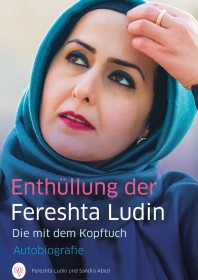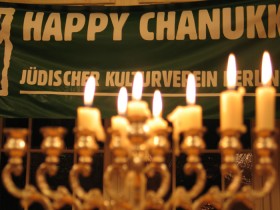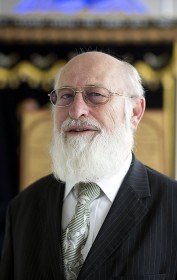A Conversation with Fereshta Ludin about the Headscarf Debate, Discrimination, and Her Hopes for the Future.
To win the right to work as a teacher in the classroom while wearing her headscarf, Fereshta Ludin had to go all the way to the German Supreme Court (see below). On 17 September 2015, she will join us as part of the series “New German Stories” to introduce her book Enthüllung der Fereshta Ludin. Die mit dem Kopftuch (“The Unveiling of Fereshta Ludin: The One with the Headscarf”). Rafiqa Younes and Julia Jürgens spoke with her in the lead-up to the event.

Book cover © Deutscher Levante Verlag
Ms. Ludin, did you ever guess that the first lawsuit you filed against your employers, in 1998 when you were 25 years old, would set off a nationwide debate about the headscarf ban?
You can’t really imagine something like that. I was still very young and idealistic. I wanted to work as a teacher and had no intention of provoking the public or any politicians.
From your perspective, was it worth it to go all that way through courts, becoming, as you did, a public figure – “the one with the headscarf” as the title of your book ironically references?
I don’t regret a single step along the way. I would have regretted much more, to have had to endure the injustice. I took an active stand against discrimination by going through the courts. Many other women were also affected. It was never my aim to become a public person. → continue reading

Hanukkah Candleholder at the 15th Hanukkah Ball of the Jewish Cultural Center, Berlin 12.12.2004 © Photo: Igor Chalmiev, gift of the Jewish Cultural Center to the Jewish Museum Berlin
25 years ago today, on 22 January, 1990, the Jewish Cultural Center was founded. One month earlier, on 13 December, 1989, the press agency ADN published an appeal in numerous East German newspapers. It announced a new coalition of Jews living in East Germany who were committed to spreading the knowledge of Jewish culture and history. The appeal was not an accident:
As early as 1986, secular Jews had found themselves gathering, at the invitation of the Jewish Congregation of (East) Berlin, to explore their Jewish roots – a heritage that no longer played any role in their parents’ identities. A group called “We for us – Jews for Jews” formed out of this second generation of political emigrants who had returned to Germany and grown up in the East. During their regular meetings → continue reading
In the summer of 2012, there was an intense discussion in Germany about whether the circumcision of boys constitutes bodily harm under the law. Preceding this so-called ‘circumcision debate’ was a decision by Cologne’s district court that criminalized the ritual circumcision of boys. A high point in the debate occurred when a German doctor registered a legal complaint against Rabbi David Goldberg, of Hof, claiming that he was liable for “dangerous personal injury” due to the circumcisions he performed. I spoke with him about the complaint, and about his feelings as well as the reactions that he encountered during that period.

Rabbi David Goldberg © private
Dear Rabbi Goldberg, how did it happen that you were reported?
That’s easy to explain: I’m known in Germany as a circumciser and I’m easy to find through my website. Opponents of circumcision were looking for a sacrificial victim and they found it in me. Because the people who made the complaints against me…
… there were more than one?
Yes, there were a number of them. But the people behind them didn’t even know me. They were simply looking for a scapegoat.
How was it for you during that period?
→ continue reading


